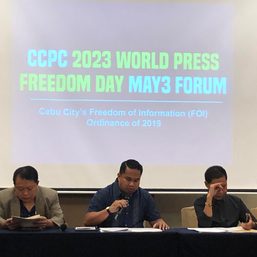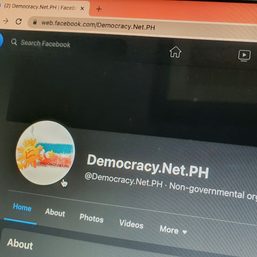SUMMARY
This is AI generated summarization, which may have errors. For context, always refer to the full article.
![[OPINION] The perils of open access](https://www.rappler.com/tachyon/2023/05/tl-openaccess.jpg)
I head the research office of my university.
Aside from managing grants that fund the research and creative work of our community, our office also facilitates support for open access publications.
The week I wrote this piece, we received an unprecedented request worth $3,700. That’s almost P206,000.
Make no mistake. That’s how much the publisher charges my colleague for only one journal article.
I repeat: Only one journal article. No more than 20 pages. Authored by my colleague.
Like any of our counterparts in the country, my university’s resources are limited. We do what we can to support the amazing work of our faculty and students.
But receiving this request was simply unexpected.
No matter how much we try, my university, even with all its resources, is at the mercy of the profit-oriented scholarly publishing industry. (A recent report claims that “publishers make around $2 billion per year” from these fees.)
And this is not unique to us. The situation might in fact be much worse for other institutions in the Philippines. It’s certainly the case for many universities in the Global South.
Worth pursuing?
They say that scholars have one of two choices: publish or perish.
That was what I heard in graduate school. At that time my peers and I were encouraged to publish even before finishing the PhD. The job market, according to our mentors, was unbearably competitive. Having some publications in your CV was a compelling way to show that you’re worth hiring.
It was the complete opposite of what I thought publishing was supposed to do: to contribute to the advancement of knowledge.
Given what I now see as a research administrator, I think the problem is far bigger.
In an era of competitive rankings, scholarly publications are tied to university reputation. University rankings are complex, but one metric they value is the number of articles published in journals they recognize.
And as if writing is not hard enough, scholars must also be cited. For various university ranking schemes, citation scores are a proxy indicator for quality. (Forget the fact that you may in fact be cited for less favorable reasons.)
Given this drive to be cited, making your publication open access is worth pursuing. Anyone around the world can download, read, and cite your work for free.
Is this a good thing? Of course it is.
It bypasses the traditional subscription model that requires readers to pay in order to download a scholarly publication, whether it’s a book, chapter, or article.
In the words of the 2002 Budapest Open Access Initiative, “Removing access barriers to this literature will accelerate research, enrich education, share the learning of the rich with the poor and the poor with the rich.”
It also claims that open access will “lay the foundation for uniting humanity in a common intellectual conversation and quest for knowledge.”
What went wrong
But like many other noble ideas, the open access model has turned out to be favorable only to those who can afford it.
You need to pay the cost to make your scholarly article downloadable for free.
This, in a way, is understandable. In the traditional subscription model, publications are behind a paywall to cover the costs of production.
Universities that can afford it will pay publishers for full subscription (usually annual) for the benefit of their faculty and students.
Individuals, otherwise, will have to shoulder the cost to download them. An article, on average, costs around $30.
In the open access model, authors themselves will have to carry the burden. This is around $2,000 but, as my recent experience proves, can be twice that amount.
But that’s not where it ends. Some journals (the most prestigious, according to some) will even charge as high as $11,000.
That’s P613,000. Again, for only one journal article.
As a result, only affluent universities or well-funded academics can afford to make their publications open access.
In the experience of many scholars around the world, the open access model has only reinforced global inequality. Scholarship produced by academics in advanced economies are accessible to all. But those authored by their counterparts in developing countries remain behind a paywall.
For these scholars, not even their peers in their own countries will get to read let alone cite their work.
Prestige game
Finally, it needs to be mentioned too that there are open access journals that do not ask for any payment at all. They are hosted by universities or professional organizations, often in countries that speak languages other than English.
Many scholars perceive them to be “less reputable than their subscription-based counterparts,” according to one study. It’s irrational but I suspect it’s also because many of these open access journals are based outside Western Europe and North America.
As a result, academics who play the prestige game will continue to aim to publish in subscription-based journals.
Filipino scholars, I know, are not exempt from this compulsion. Whether we like it or not, we’re assessed based on whether we’ve published in the “right” outlets on the “right” topics that can be “rightly” cited.
And driving it is the global competition among universities.
This is a far cry from the very aspiration of the open access initiative, which, as I’ve quoted above, is to “accelerate research” and “enrich education.”
What can we do?
Echoing my colleagues around the country, I’m convinced that “science is for the people.”
And a truly open access model will benefit the public.
In a way, the inadequacies of the open access model as we know it are only symptoms of deeper problems in Philippine academia, where inequality is real.
For this reason, our scholarly community must confront some of these questions: For whom are we writing? Who benefits from the work that we do? And who gets to participate in it?
We must also push for innovative practices to confront the divides in Philippine academia.
Can policies support open access publication across our institutions? Can universities pool resources to build our collective capacities? From the quality of our libraries to the training of young academics, there are many possibilities.
And finally, we must take seriously the institutions that deepen academic inequalities.
How should Philippine universities relate to the global publishing industry? And is there a better way for us to approach university rankings?
If the academe has taught me one thing, it’s that no one person has the answer to all questions. This is why the call for genuine open access, in my view, is ultimately a call for honest conversations about our wicked problems. – Rappler.com
Jayeel Cornelio, PhD (TOYM 2021) is the Associate Dean for Research and Creative Work at the Ateneo de Manila University and Vice Chair of the Social Sciences Division of the National Research Council of the Philippines. Follow him on Twitter @jayeel_cornelio.
Add a comment
How does this make you feel?
![[ANALYSIS] University rankings are an illusion](https://www.rappler.com/tachyon/2020/11/university-rankings-november-27-2020.jpg?fit=449%2C449)




There are no comments yet. Add your comment to start the conversation.